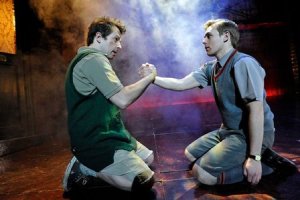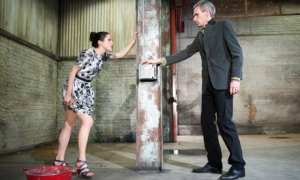26/04/11
“Have you ever heard the story of the Johnstone twins?”
Yes. Yes I have. In fact I first heard the story of the Johnstone twins around 12 years ago when my school took me to see Blood Brothers in Birmingham. It wasn’t a successful trip (not least because the school bully was sitting behind me and saw fit to kick my chair/pull my hair for the duration of the performance) but I still left with the songs echoing in my cranium. Many years have passed, and I hadn’t seen or heard Blood Brothers since – so it was with a strong sense of nostalgia that I went to the New Theatre to see the latest touring production.
Set against the backdrop of ’60s Liverpool, Blood Brothers tells the story of twins Mickey and Eddie, separated at birth when their mother, known simply as Mrs Johnstone, gives Eddie up to her wealthy employer with the promise of a better life for one of her sons. The twins grow up at opposite ends of the social spectrum, though they are inexplicably dawn together throughout their life, leading to tragic conclusions. The script encapsulates the dichotomy of rich and poor, with the inspired theme of superstition and fate running throughout.
This production represents a challenge for actors, especially the eponymous brothers, who play the characters at seven, fourteen, eighteen and finally as grown adults – the journey they take us on is remarkable, particularly Sean Jones as Mickey who plays both his adult character and a convincingly child-like seven-year-old with aplomb. Niki Evans is also outstanding as Mrs Johnstone, managing to capture the vulnerability of the twin’s desperate mother and moving between the upbeat and the heart-wrenching numbers with ease.
There were a few issues with the production. I was a little disappointed with Paul Davies as Eddie – his characterisation was too subtle for the large stage, and his voice was barely audible, even with a microphone. Also there are some aspects of the show that are now dated, most notably the narrator – who dips in and out of the story, forcing the narrative to pause in a freeze frame while he rambles on about superstitious elements that aren’t really relevant. It feels like a very 80’s motif, and one that could do with an update. In the same way, the score sometimes dips into 80’s nostalgia, and we are treated to a rathery unnecessary saxophone solo at one point which lays the echo on a bit too heavily.
Despite these issues, Bill Kenwright’s production remains exciting and intense, and has more familiar songs than you perhaps realise. The sleek combination of comedy and tragedy is done with finesse, and the overriding theme of class is approached with taste.
Willy Russell’s lyrics and dialogue is powerful, and captures both humour and emotion. His colloquial way of writing endears him to just about everybody and the audience instantly empathize with his characters. It is unfortunate, in a way, that the key themes of this play still pack a powerful punch. The examination of nature vs nurture debate has never been more clearly spelt out, and the role that class has in this debate make the tragic tale of the Johnstone twins incredibly relevant.

